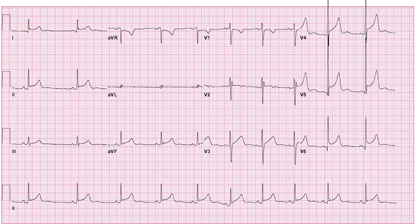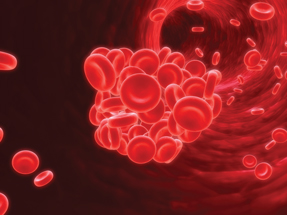MKSAP Quiz: Pleuritic chest pain
A 34-year-old woman is evaluated for sharp intermittent pleuritic chest pain that has persisted for 1 week. The pain is worse when she lies down in the supine position. She has had no fever, chills, cough, or weight loss. She had acute viral pericarditis 6 months ago that was treated initially with ibuprofen, but when she failed to respond after 3 days, a 10-day tapering dosage of prednisone was instituted, leading to resolution of clinical symptoms. She has a 10-year history of essential hypertension, and she takes hydrochlorothiazide and potassium chloride.
On physical examination, temperature is normal, blood pressure is 98/54 mm Hg, pulse is 99/min, and respiration rate is 20/min. Cardiac examination discloses a pericardial friction rub at the lower left sternal border but no gallops. Pulmonary auscultation reveals normal breath sounds and no crackles. There is no jugular venous distention and no chest-wall tenderness. Laboratory studies reveal a serum creatinine level of 1.0 mg/dL (76.3 µmol/L). Electrocardiogram is shown. Chest radiograph shows a normal-sized cardiac silhouette and clear lung fields.

Which of the following is the most appropriate treatment?
A. Colchicine
B. High-dose aspirin
C. High-dose ibuprofen
D. Prednisone
Answer and critique
The correct answer is A: Colchicine. This question can be found in MKSAP 15 in the Cardiology section, item 34.
This young patient has a history of acute viral pericarditis and presents with pleuritic chest pain and a pericardial friction rub. The likely diagnosis is recurrent pericarditis. The ST-segment elevation on the electrocardiogram is concave upward and PR-segment depression is present, further supporting the diagnosis. Prior treatment of acute viral pericarditis with prednisone predisposes to recurrent pericarditis. Because of its efficacy, colchicine has emerged as the treatment of choice for acute bouts of recurrent pericarditis and can be useful in the prevention of recurrences. Treatment duration is 6 months. Treatment of pericarditis with colchicine is an off-label use. Colchicine is contraindicated in patients with chronic kidney disease. However, this patient has no signs of chronic kidney disease.
High-dose aspirin and NSAIDs are first-line agents for the treatment of an initial episode of viral or idiopathic pericarditis. However, high-dose aspirin therapy is less effective in the treatment of recurrent pericarditis and is complicated by gastrointestinal adverse effects with long-term use. High-dose NSAIDs, such as ibuprofen, are useful adjuncts to colchicine therapy in the treatment of recurrent pericarditis, but are less effective as first-line agents in the treatment of recurrent bouts of pericarditis.
The use of systemic corticosteroids early in the course of acute pericarditis is associated with an increased frequency of relapse, as was seen in this patient. Corticosteroids are considered third-line agents for refractory cases of recurrent pericarditis.
Key Point
- Colchicine is the treatment of choice for acute bouts of recurrent pericarditis.





